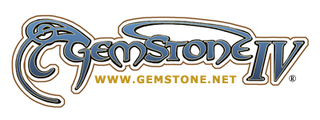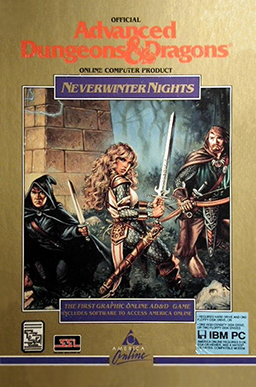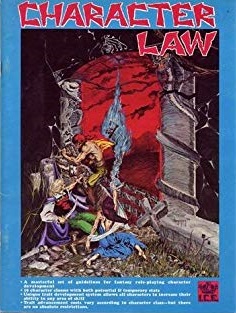
EverQuest is a 3D fantasy-themed massively multiplayer online role-playing game (MMORPG) originally developed by Verant Interactive and 989 Studios for Windows PCs. It was released by Sony Online Entertainment in March 1999 in North America, and by Ubisoft in Europe in April 2000. A dedicated version for Mac OS X was released in June 2003, which operated for ten years before being shut down in November 2013. In June 2000, Verant Interactive was absorbed into Sony Online Entertainment, who took over full development and publishing duties of the title. Later, in February 2015, SOE's parent corporation, Sony Computer Entertainment, sold the studio to investment company Columbus Nova and it was rebranded as Daybreak Game Company, which continues to develop and publish EverQuest.
Rolemaster is a fantasy tabletop role-playing game published by Iron Crown Enterprises in 1980. The game system has undergone several revisions and editions since then.

Pool of Radiance is a role-playing video game developed and published by Strategic Simulations, Inc (SSI) in 1988. It was the first adaptation of TSR's Advanced Dungeons & Dragons (AD&D) fantasy role-playing game for home computers, becoming the first episode in a four-part series of D&D computer adventure games. The other games in the "Gold Box" series used the game engine pioneered in Pool of Radiance, as did later D&D titles such as the Neverwinter Nights online game. Pool of Radiance takes place in the Forgotten Realms fantasy setting, with the action centered in and around the port city of Phlan.

Neverwinter Nights is a role-playing video game developed by BioWare. Interplay Entertainment was originally set to publish the game, but financial difficulties led to it being taken over by Infogrames, who released the game under their Atari range of titles. It is the first installment in the Neverwinter Nights series and was released for Microsoft Windows on June 18, 2002. BioWare later released a Linux client in June 2003, requiring a purchased copy of the game to play. MacSoft released a Mac OS X port in August 2003.

Dark Age of Camelot is a massively multiplayer online role-playing game released in October 2001 in North America, and in January 2002 in Europe. The game combines Arthurian lore, Norse mythology, and Celtic mythology with high fantasy. It is set in the period after King Arthur's death, when his kingdom has split into three realms, which are in a constant state of war with each other. Dark Age of Camelot includes both player versus environment (PvE) and realm versus realm (RvR) combat.

GemStone IV is a multiplayer text-based online role-playing video game produced by Simutronics. Players control characters in a high fantasy game world named "Elanthia". The first playable version of the game was known as GemStone ][ and was launched in April 1988 on GEnie. It was one of the first MMORPGs and is one of the longest running online games still active. Access to the game is subscription-based through its website, with three additional subscriptions levels available, "Premium", "Platinum" and "Shattered", in addition to a free-to-play model introduced in early March 2015.

Warhammer Online: Age of Reckoning was a massively multiplayer online role-playing game based on Games Workshop's Warhammer Fantasy setting, developed by Mythic Entertainment and published by Electronic Arts in 2008. The game revolved around the continual worldwide conflict that the Warhammer Fantasy setting is known for, and the game is geared toward ongoing, constant war laced with dark humour. Age of Reckoning ended up selling over a million copies and peaking at 800,000 subscribers, but dropped to 300,000 subscribers several months later. The game received generally positive reviews from critics but shut down in 2013. Since at least 2014, an active private server called Return of Reckoning has been run by fans, and it remains active as of June 2024.

Spyro is a platform game series originally created by Insomniac Games as an exclusive for Sony's PlayStation console. The series features the adventures of the main protagonist of the title character, a dragon. Since the series' introduction in 1998, there have been numerous sequels and a reboot trilogy. The series was originally produced by Universal Interactive, later became known as Vivendi Games; the rights to the intellectual property were acquired by Activision after its merge with Vivendi in 2008.

The Shadow of Yserbius, originally published by Sierra On-Line and developed by Joe Ybarra of Ybarra Productions, was the first of three graphical MUDs for the online community. The Shadow of Yserbius and its successors remained online until 1996, when America Online purchased the rights from AT&T for an undisclosed price. AOL soon abandoned The Shadow of Yserbius, which was a competitor to its existing online RPG Neverwinter Nights.

Mythic Entertainment was an American video game developer based in Fairfax, Virginia that was most widely recognized for developing the 2001 massively multiplayer online role-playing game Dark Age of Camelot. Mythic was a prolific creator of multiplayer online games following its establishment in the mid-1990s.
Mark Jacobs is an American game designer, programmer, author and businessman, and the former GM/VP/CEO of Mythic Entertainment, Inc and after Mythic Entertainment was sold to Electronic Arts in 2006 he served as its GM/VP/CEO at EA. Best known as a lead designer of Dark Age of Camelot (2001) and Camelot Unchained (unreleased), he also created two early MUDs, Aradath and Dragon's Gate, serving as both the designer and programmer in addition to his duties as President/CEO. He founded A.U.S.I. in 1983 and worked on a number of computer games for systems such as the Apple II. Jacobs left EA in 2009 after the company decided to merge BioWare with Mythic Entertainment.
GameStorm was an online gaming service founded by Kesmai corporation in November 1997. It offered several online video games at a flat monthly fee of $10 per month, a relatively radical payment system in the age of pay-by-hour online gaming. Both Kesmai and GameStorm were sold to Electronic Arts in 1999, and shut down by Electronic Arts in 2001.

Magic systems in games are the rules, limitations, abilities, and characteristics that define magic in a game.
Dragon's Gate was an interactive, real time, text-based multi user online fantasy role-playing game, sometimes referred to as a MUD. It was one of the longest running pay-for-play online games in the world, it opened to the public in the spring of 1990 on GEnie. In 1996 the game was moved to AOL. Later the game was moved to Mythic Realms, and finally to independent server, where it ran until the summer of 2007.

Neverwinter Nights was an early graphical multiplayer online role-playing game, which ran from 1991 to 1997 on AOL.
The history of massively multiplayer online games spans over thirty years and hundreds of massively multiplayer online games (MMOG) titles. The origin and influence on MMO games stems from MUDs, Dungeons & Dragons (D&D) and earlier social games.
World of Warcraft (WoW), is set in a fictional universe, with its primary setting being the planet of Azeroth. The first expansion, The Burning Crusade, introduced a second planet, Outland. Wrath of the Lich King expanded upon Azeroth and added Northrend, the frigid northern continent of Azeroth, while the next expansion, and Cataclysm, drastically changed various other continents by destroying some and unveiling new ones. The next expansion, Mists of Pandaria, added Pandaria, the southern continent previously hidden behind a perennial mist cover. Warlords of Draenor introduced the planet of Draenor, a version of Outland in a different timeline before its partial destruction. The Legion expansion took adventurers to the Broken Isles, an island chain near the Maelstrom in the middle of the Great Sea, and the damaged planet Argus, the headquarters of the Burning Legion. The seventh expansion, Battle for Azeroth, added two new island continents to the center of Azeroth: Kul Tiras and Zandalar. The latest expansion, Shadowlands, introduced the eponymous Shadowlands, a realm composed of five major zones: Bastion, Maldraxxus, Ardenweald, Revendreth, and the Maw.

A video game console emulator is a type of emulator that allows a computing device to emulate a video game console's hardware and play its games on the emulating platform. More often than not, emulators carry additional features that surpass limitations of the original hardware, such as broader controller compatibility, timescale control, easier access to memory modifications, and unlocking of gameplay features. Emulators are also a useful tool in the development process of homebrew demos and the creation of new games for older, discontinued, or rare consoles.

Spell Law is a role-playing game supplement first published by Iron Crown Enterprises (ICE) in 1981 and written by Peter C. Fenlon, Jr., S. Coleman Charlton, and Terry K. Amthor, with Steven E. Moffat. It was originally published as a separate boxed set of four books, but was included in the initial 1984 release of the fantasy role-playing game Rolemaster, and a separate third edition Spell Law book for Rolemaster was published in 1986 and a fourth edition book in 1989. Spell Law contains over 2,000 spells for role-playing game characters. It received mixed reviews in game periodicals including Ares, Different Worlds, The Space Gamer, and Dragon.

Character Law is a supplement published by Iron Crown Enterprises (ICE) in 1982 for the fantasy role-playing game Rolemaster.













